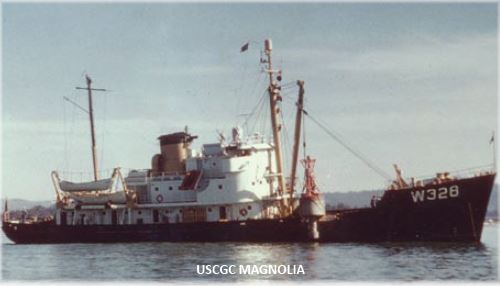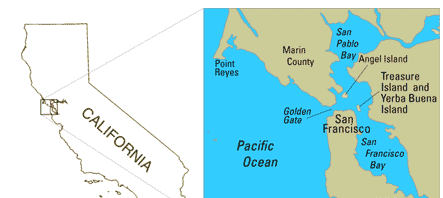In 1954, when I was a Lieutenant in the U.S. Coast Guard, I was assigned as Commanding Officer of the USCGC MAGNOLIA, a 189‑foot buoy tender and former U.S. Army net tender. The “MAGGIE,” as she was affectionately known by the crew, was stationed at the Coast Guard buoy depot on Yerba Buena Island, in the middle of San Francisco Bay. We were responsible for maintaining the floating aids to navigation and lighthouses in San Francisco Bay and the northern California seacoast to the Oregon state line. The ship had a heavy schedule, which required us to be absent from our home port for two weeks each month. Each member of the ship’s company was needed to carry out our responsibilities. Anyone who didn’t carry his load increased the load on other members of the crew. One of the crewmen, a fireman, was a constant disciplinary problem. He was constantly “wising off” at the Senior Petty Officers who were his supervisors. He was late coming back from liberty, he couldn’t or wouldn’t get up at reveille, and he was always late for quarters and drills. The list of his minor infractions seemed endless.
One morning, as I arrived at the ship, I was met at the gangway by the Exec, a customary sign of respect on board military ships. On this occasion, he seemed agitated, and he told me that he was placing this fireman on report. As we discussed this, it became evident that this time the man had gone way over the line in his resentment of authority. The Exec had given him a direct order to do (or not to do) some task. Rather than obey the order, the fireman invited the Exec to “come out on the dock and settle this man to man!” This was such a serious breach of discipline that I thought it necessary to handle it quickly and severely.
I must explain that I was aware that my authority to administer summary punishment was greatly increased if the offense was committed by a person who was “attached to, and embarked upon a ship.” At this point, my lawyer friends always wince as I tell this story. My ship was tied up to the dock, so I ordered that it be gotten underway. We hove to about 3 miles south of the depot, roughly in the center of the south part of San Francisco Bay. I had not planned to get underway that day, I had planned to grant all hands early liberty since it was Christmas Eve, but this incident required immediate attention.
In accordance with the Uniform Code of Military Justice, Article 15, I convened a “mast.” The term for this procedure has its origins in sailing ship days, when the Captain of the ship brought the accused “before the mast” to hold a disciplinary hearing. I advised the fireman that he had a right to remain silent, and then we heard the Exec read the charge. There were numerous witnesses to the incident; it was obvious that the fireman was guilty, and I found him so. I awarded him as punishment, one week’s confinement on reduced rations at the U.S Marine Disciplinary Barracks at the U.S. Naval Station, Treasure Island. I advised him that if he considered the sentence unjust or not consistent with that awarded in other cases, he could appeal this sentence to the Commander, Twelfth Coast Guard District (our operational commander.)
That completed, we returned to our berth at Yerba Buena Depot. The Exec called the Marine Disciplinary Barracks; the Marine guard came, received the formal incarceration papers, and picked up the fireman, who was hand cuffed and taken away. On New Year’s Eve, he was returned to the ship, much chastened and docile. We never had any problem with him for the remainder of the time I was on the ship. I heard informally that he had been discussing his confinement with his shipmates. He told them that the Marines held reveille at 0430 and did not allow them to sit down– even when eating– all day long. They were given rigorous drills and exercises until 2000, when they were allowed to turn in after an exhausting day. There was no radio, no TV, no reading material, and no conversation allowed. He told his shipmates that he would never want to go through that again.
Over the next several years, this incident gradually faded from my memory. By this time I was a Lieutenant Commander assigned to Coast Guard Headquarters in Washington, D.C. One day at lunch hour, as I was going to the bank to deposit my paycheck, I heard a familiar voice behind me saying, “Captain Reinburg.” Commanding officers, regardless of rank, are addressed as Captain. I turned and saw the fireman, now in civilian clothes, coming toward me. I wondered briefly if he intended to assault me in front of the many people passing by.
Instead, he approached, smiling, held out his hand, and shook mine warmly. He told me how wonderful it was to see me; he had hoped that he might again meet me some day. He said he wanted to thank me. He had been on a very destructive course, and I really turned his life around. He said that he was in his last year at George Washington University Law School, and he owed his success to me and the disciplinary action I took.
I returned to the office feeling a sense of accomplishment that I cannot describe properly. I felt as though I had “rescued” a lost sheep, and I had a heady sense of pride, although at the time of the incident I wondered if I overreacted.
(Originally published in Officer Review, Vol. 48 No. 8, April 2009, The Military Order of the World Wars. Awarded the Vice Admiral George C. Dyer Award, First Place.)



Dear Capt. Reinburg, my MAGNOLIA story is titled:
“What’s a weather guesser AG doing on a buoy tender?”
I was a Coast Guard AG3-2 stationed at downtown SF COMWESTAREA SAR weather section in 55-57. One of the COMWEST staff officer’s thought it would be a good idea if the “land locked” AGs (6 of us) were provided with some sea duty. We were then selectively sent to whatever cutter was available a the time. I thought I would get either the TANEY of GRESHAM at Base Alameda!
However, in July 56, I was given 2-weeks TAD temp duty to the MAGNOLIA berthed at Yerba Buena. You guessed it … the MAGNOLIA never left YBI dock.
I’m always proud to say that God and the Coast Guard made my life.
Best regards, bill